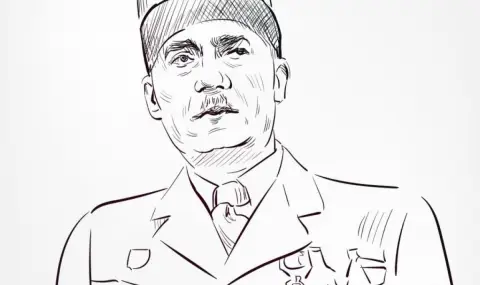On January 8, 1959, General Charles de Gaulle was declared the first president of the Fifth Republic of France.
But who is Charles de Gaulle?
Charles-André-Joseph-Marie de Gaulle was born on November 22, 1890. He was born in Lille, into a family of Catholic aristocrats. His father was a professor of philosophy and taught literature at the local Jesuit school.
The young de Gaulle was greatly influenced by his father. From an early age, he was fascinated by military affairs. He studied at the Saint-Cyr Military School, graduating at the age of 22.
Charles de Gaulle fought against the Germans in both world wars. During the Great War, he was captured and made five unsuccessful escape attempts. During the invasion of the Third Reich divisions, he fought heroically against them. He was forced to flee to Algeria. There, he organized the remnants of the French army, only to return in 1944 at the head of a combat-ready army and declare: “Paris is free”.
Post-war France was torn apart by political struggles.
September 28, 1958 marked the end of the Fourth French Republic. The new constitution was approved by the votes of more than 79% of the French people. And at the end of December 1958, General Charles de Gaulle was elected the first president of the Fifth French Republic.
Years later, one of the iconic figures of France dealt with the Algerian crisis through a referendum.
On September 16, 1958, Charles de Gaulle declared himself in favor of self-determination for Algerians. This led to the outbreak of a rebellion in Algeria by the neo-colonialists. The general quickly managed to suppress the rebellion. On February 3, 1959, De Gaulle pushed through parliament a law that gave him extraordinary powers for one year. On January 8, 1961, a referendum was held on the issue of Algerian self-determination. The results showed that 75% of the population supported De Gaulle's policy.
In the early 1960s, General Charles de Gaulle's not particularly active social policy
led to a strengthening of the student movement.
On May 1, 1968, mass student demonstrations and rallies began. On May 10-11, the riots escalated into a mass battle with the police. On May 13, a general strike began, which took on an anti-Gaulist character. On May 30, De Gaulle dissolved parliament and the situation normalized.
On April 27, 1969, the general held a referendum on a reorganization law, which was a kind of vote of no confidence in him. The next day, he was forced to resign.
